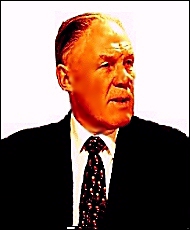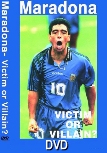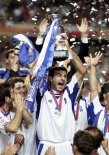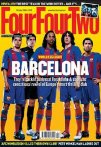| Videos DVDS | |Jerseys Games | Posters Mags | Books Tickets | Soccer Shoes | T-Shirts | Mall |
| Videos DVDS | |Jerseys Games | Posters Mags | Books Tickets | Soccer Shoes | T-Shirts | Mall |
| Other Soccer News... |
RINUS MICHELS |
Name : Rinus Michels
Date of Birth: 9 February, 1928
Date of Death: 3 March 2005
Birthplace: Amsterdam, Netherlands

If the Netherlands teams of the 1970s were in fact the “Clockwork
Oranje,” then Rinus Michels was the genius watchmaker behind the machinery.
As the conductor of one of modern football’s most brilliant symphonies,
the Dutch innovator was the firm, hushed boss behind the bright orange strip
of Totaal Voetbal’s finest.
Born in 1928, and an infrequent international forward in the 1950s, Michels truly made a name for himself coaching first on the European club scene with Ajax from 1965 to 1971 and then with Holland at the 1974 FIFA World Cup Germany™. Led on the pitch by the immaculate Johan Cruyff, the losing finalists were admired the world over for their manner of play, which reflected “Iron Rinus’s” belief in fostering both team coherence and individual imagination.
First Europe, then the world
Did You Know?
* Czech coach Frantisek Fadrhonc actually lead Holland to the Germany 74 finals thanks to goal difference over neighbours Belgium. When Michels took over, Fadrhonc became his assistant.
* In the five international matches that Michels played in for the Netherlands, the team lost all of them by a combined score of 21-4.
* The Dutch were ahead of rivals Germany 1-0 in the final of the 1974 FIFA World Cup before the hosts had even touched the ball. Fifteen passes and Cruyff took his legendary run into the box, where he was awarded a penalty. Johan Neeskens converted from the spot to give the visitors a 1-0 lead in the match they eventually lost 2-1.
* Michels started the same 11 players in every match of Germany 74, except in the group contest against Sweden when he inserted Piet Keizer for Rob Rensenbrink.
Though his club coaching career took him to Los Angeles, Germany and most notably Barcelona, where he established a Dutch connection with the Catalan club that still exists today, Michels and his most significant achievements are linked to Amsterdam club Ajax and Holland’s national team. It was with those two that the “total football” movement that he fostered would flourish in the late 1960s and early 70s.
The first Dutchman appointed to the top job at Ajax on 22 January, 1965, Michels took over a team that just missed relegation and within a few seasons turned the club into a European contender. This improvement culminated in winning the 1971 European Cup, which was to be his last match in charge of the Amsterdammers.
Though the team he built would go on to win two more consecutive European Cups, Michels, a bright and serious man - nicknamed “the Sphinx” because of his stony features - took a major plunge into the heated world of Spanish football with Barcelona.
By that point Michels was already known for his strategies emphasising intelligent movement and players with a complete range of skills. He had moderate success at the forward-thinking Catalan club, but it was back with a Dutch team, this time as the natural choice to lead the national side at Germany 74, that he made his definitive statement.
The figure most closely associated with Michels achievements is the magical Cruyff, the playmaker who seemed to fill up the cracks in the coach’s ambitious game plan with his uncanny ability to read a match. With the kaleidoscopic shifting of players, rotating into and out of defence and swarming about the ball, Cruyff was the on-field organiser that brought Rinus’s ideas to life.
The mentor and his star forward worked together at Ajax and Barcelona, but it was with de Oranje, in Michels first stint in charge at the age of 46, that Cruyff and a band of willing accomplices taught the world a new kind of football. Ironically, not much was expected of the 1974 Netherlands team, and Michels had only three preparation matches in charge before the finals.
But, made up of mostly Ajax and Feyenoord players, the men came together quickly, breezing through their opening group after beating Uruguay 2-0, drawing with Sweden 0-0 and crushing Bulgaria 4-1. Even in the second group phase, the likes of Jonny Rep, Johan Neeskens and Rob Rensenbrink helped Cruyff demonstrate the gulf in class between them and beaten rivals Argentina (4-0), Germany DR (2-0) and even mighty Brazil were dismissed 2-0.
Although the side fell 2-1 in the final to hosts Germany, Michels and Holland are surely one of the greatest teams never to have won a FIFA World Cup. If they had triumphed that famous day in Munich, the 1974 Holland may have been uttered in the same breath as Brazil circa 1970. A varied generation of Dutch flexibility and sheer understanding of the game of football was harnessed by Michels, who did a remarkable job building multifarious factions into a whole.
He wrote later in his life about that fundamental task that he seemed to do so well: “It is an art in itself to compose a starting team, finding the balance between creative players and those with destructive powers, and between defence, construction and attack – never forgetting the quality of the opposition and the specific pressures of each match.”
After the bittersweet final, Michels went back to his club career with Barcelona, though he never strayed far from Ajax or the national team. Nor did he ever achieve as much as he did with Holland. In his four stints in charge, he coached the Dutch to 30 victories and 14 draws in 54 contests.
Most remarkably he led an entirely new generation of players to European glory in 1988. Ironically, Michels gained revenge when his side beat European Championship hosts German 2-1 in the semi-final, en route to a 2-0 victory in the final over the Soviet Union. This new team featured a spine made up of the lethal Marco Van Basten in attack, the magnificent Ruud Gullit in midfield and the sturdy Frank Rijkaard in defence.
Though he had mostly adapted his concept of Totaal Voetbal to fit the times, Michels team still featured skilled players all over the pitch and a commitment to play creative attacking football. His controversial decision to have the relatively elegant Rijkaard and Ronald Koeman in the centre of defence was proof of that. A thankful world applauded appreciatively as the Dutch lifted their well-deserved first major trophy under the strict watch of the 60-year-old manager.
Four years later, Michels led his team to the semi-final of the European Championship where they were only eliminated by tournament darlings Denmark in a semi-final penalty shootout.
Tactics
Of course, Michels is best known for what is essentially the anti-tactics of Total Football, a manner of play less than a strategy legendary for allowing players to adjust their positions and runs in order to exploit the space allowed by the opposing team. The legendary Germany 74 ostensibly lined up in a 4-3-3 with Jonny Rep charging down the right flank and Rob Rensenbrink doing the same down the left. Charges from fullbacks Wim Suurbier and Ruud Krol added further options in an attack that seemed to swell and recede at will, while Cruyff was given license to roam the pitch looking for ways to unlock opposing teams. The key to Michels concept was intelligent movement, understanding and fitness.
Management Career
National teams
* 1974 Netherlands
* 1984 - 1986 Netherlands (Technical Director)
* 1986 - 1988 Netherlands
* 1990 - 1992 Netherlands
International honours
* 1974 FIFA World Cup Germany™ runner-up
* 1988 European Champion
Clubs
* 1965 - 1971 Ajax
* 1971 - 1975 Barcelona
* 1975 - 1976 Ajax (Technical Director)
* 1976 - 1978 Barcelona
* 1978 - 1980 Los Angeles Aztecs
* 1980 - 1983 FC Köln
* 1988 - 1989 Bayer Leverkusen
International honours
* 1966, 1967, 1968, 1970 Netherlands League Champion
* 1967, 1970, 1971 Dutch Cup Champion
* 1969 European Cup runner-up
* 1971 European Cup Champion
* 1974 Spanish League Champion
* 1978 Spanish Cup Champion
* 1983 German Cup Champion
Playing Career
International honours
* 5 International appearances
Club
* 1946 - 1958 Ajax
Club honours
* 1947, 1957 Netherlands League Champion
* 269 Appearances and 121 goals for Ajax
Source: FIFA.com
 |
 |
 |
 |
 |
 |
| Videos | New Posters | CALENDARS | Books | Magazines |
FUSSBALLSTORE.COM |
 |
 |
| ADD YOUR LINK TO THE WORLD'S LEADING SOCCER MAGAZINE - CLICK HERE |